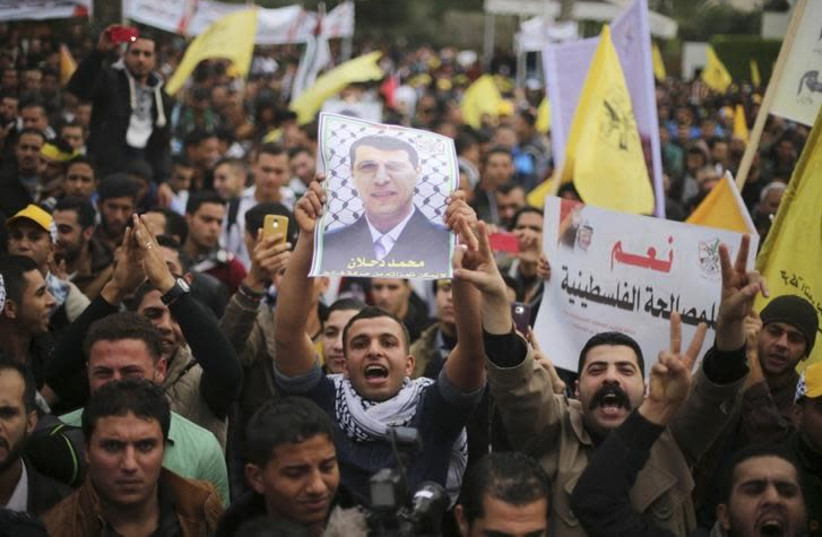A visit to Moscow last week by exiled Fatah leader Mohammed Dahlan has revived talk among Palestinians about a possible reconciliation between him and Palestinian Authority President Mahmoud Abbas.
During the visit, Dahlan and two officials from his Democratic Reform Movement, a dissident Fatah group, met with Russian Foreign Minister Sergey Lavrov and his deputy, Michael Bogdanov. The two officials who accompanied Dahlan are Samir Mashharawi and Ja’far Hdeib.
Earlier this year, Dahlan led another delegation from his group to Moscow, where they met with Bogdanov. The delegation discussed preparations for holding the Palestinian parliamentary elections, which were supposed to take place on May 22.
The discussions also focused on the need to end the rivalry between Fatah and Hamas and Abbas and Dahlan.
In late April, Abbas called off the elections on the pretext that Israel did not reply to his request to hold the elections in east Jerusalem.

Dahlan’s recent visit to Moscow came amid unconfirmed reports of tensions between him and the United Arab Emirates, where he has been living for the past decade.
The visit came as Fatah prepares to hold its eighth general assembly in March 2022. It also came on the eve of Abbas’s planned visit to Moscow for talks with Russian President Vladimir Putin. The meeting is expected to take place on November 23, Palestinian officials said on Saturday.
Abbas is hoping that Russia would endorse his plan to activate the Quartet, which consists of the US, Russia, United Nations and European Union – as a main broker in future peace talks between Israel and the Palestinians.
A source close to Dahlan was quoted over the weekend as saying that Lavrov was mediating to end the dispute between the former PA security commander in the Gaza Strip and Abbas.
Russia previously made an effort to end the dispute between Abbas and Hamas, but to no avail.
The source said that Dahlan arrived in Moscow at the invitation of the Russian leadership to discuss the latest developments in the Palestinian arena, including a possible reconciliation with Abbas.
In 2011, Dahlan moved to the UAE after PA security forces raided his home in the Ramallah suburb of Tira and arrested some of his associates. The raid came hours after a Fatah disciplinary court rejected Dahlan’s appeal against the decision by the Fatah Central Committee to expel him from the faction.
According to reports in the Arab media, Dahlan serves as a special adviser to UAE Crown Prince Mohammed bin Zayed.
In 2016, a PA court sentenced Dahlan in absentia to three years in prison on charges of embezzlement of public funds. Dahlan has denied the charges.
During the meeting with Lavrov, Dahlan reportedly affirmed readiness for internal reconciliation in Fatah.
But a senior Fatah official in Ramallah said on Saturday that Abbas has no intention of mending fences with Dahlan. “Dahlan belongs to the past,” the official said. “He has been convicted by a Palestinian court and if he arrives in the West Bank he will be imprisoned.”
Mashharawi said that the talks in Moscow were important because they came at a time when the PA leadership was continuing to wage war on Dahlan’s group because of its demand for reform in Fatah. The meeting, Mashharawi added, reflects the importance and presence of the Democratic Reform Movement in Fatah.
According to Mashharawi, Israel has always tried to exploit the divisions among the Palestinians to argue that there is no Palestinian partner for peace.
Palestinian political analyst Akram Atallah said that the dispute between Abbas and Dahlan has divided Fatah. Atallah pointed out that Abbas was now at loggerheads with two other senior Fatah officials, Nasser al-Qudwa and Marwan Barghouti.
“All indications show that the upcoming Fatah conference (in March) will not restore the faction’s glory,” Atallah told the Al-Kofiya news website, which is affiliated with Dahlan. “[Former] Palestinian leader Yasser Arafat founded Fatah on the basis of diversity; it was the only faction that kept its opponents inside the faction.”
Palestinian writer Emad Omar said that some Fatah officials do not want to see their faction united, thus intensifying the dispute between Abbas and Dahlan. Omar pointed out that Fatah was planning to run under three separate slates in the parliamentary elections.
Al-Qudwa and Barghouti, who is serving five life sentences in Israeli prison for his role in terrorist attacks against Israelis during the Second Intifada two decades ago, formed their own electoral list called “Freedom,” openly challenging the Abbas-affiliated slate.
Fatah dissidents affiliated with Dahlan were also planning to contest the vote as part of a sperate list.
Dahlan is apparently hoping to solve his dispute with Abbas ahead of the Fatah general assembly with the hope of returning to the faction. Such a move would allow Dahlan to join the list of candidates touted as potential candidates to succeed the 85-year-old Abbas. The list includes, among others, PA General Intelligence Chief Majed Faraj, Senior Fatah officials Hussein al-Sheikh, Jibril Rajoub and Mahmoud Aloul, as well as Prime Minister Mohammed Shtayyeh.
